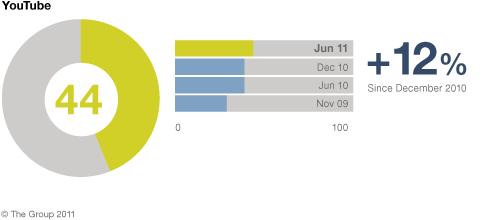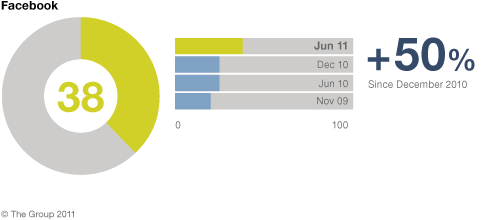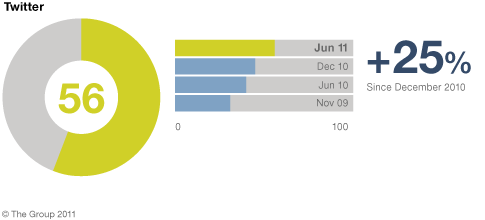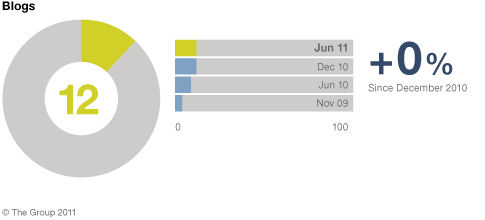Latest research from digital communications agency The Group shows that there has been a dramatic rise in the number of companies using social media in their corporate communications programmes. For example, the number of FTSE 100 companies using Facebook has jumped from 25 per cent to 38 per cent in the last six months, 56 per cent now use Twitter, an increase of 40 per cent in six months, while 41 per cent have an official YouTube site.
The percentage of FTSE 100 companies on YouTube:

The percentage of FTSE 100 companies on Facebook:

The percentage of FTSE 100 companies on Twitter::

When it comes to blogging however, the picture is very different. Frank Harkin, consultant at The Group explains: “There has been no change in the number of corporate blogs linked to the UK’s largest listed businesses over the last six months. Although the number that do run a true corporate blog has increased since 2009 from 4 per cent to 12 per cent this year, the figure remains surprisingly low.“

Harkin believes companies that fail to blog are missing a trick. He says, “Blogging is one of the oldest and most established social media channels. From a corporate perspective it provides companies with a platform to talk about their activities, canvas opinion, manage reputation, attract talent and promote initiatives and events. It takes a bit of effort, but with planning, dedication and buy-in across the organisation a corporate blog (or suite of blogs) can be a powerful communication tool.”
In the US, corporate blogging is in rude health. Harkin says there are many examples of companies that have taken full advantage of blogging. Large technology companies such as Microsoft, Cisco, Oracle and Dell have well-known and sometimes celebrated blogs while CEOs such as Bill Marriott of the Marriott Hotel Group and John Mackey of Whole Foods lead the way in executive blogging. Other excellent blogs from across the pond include eBay's Ink blog and the Walmart Gives Back blog.
Yet UK companies remain sceptical about blogging and lag far behind their counterparts in the US where 36 per cent of the Fortune Global 500 and 22 per cent of the Fortune 500 run blogs.
However, Harkin points out that there are some good FTSE 100 blogs including Centrica views (Centrica is a client of The Group), Carnival senior cruise director John Heald’s blog and Shell’s climate change blog. Yet these are the exceptions to the rule.
Harkin says that a critical reason for the lack of UK blogs may be put down to cultural differences: “The management of UK companies are simply less disposed to promotion, particularly if it is deemed to be self-promotion.“
Other reasons Harkin gives for UK companies failing to blog is because writing a personalised blog takes commitment and time. It also takes a certain frame of mind and confidence. He adds: “Even with the input of corporate PR team writers, blogging can be demanding. It requires a level of skill and experience to execute effectively and therefore probably the time of a more senior team member.”
It may be that UK companies are yet to overcome the fear factor that comes with opening up to different audiences through a blog. But Harkins says it could also be the case that the leaps seen in the use of Twitter and Facebook are because these are easier options.
In conclusion, Harkin says: “The general upward trend of social media use among FTSE 100 companies suggests that concerns about delivering corporate information through such fluid and instantaneous channels are diminishing as corporate communications teams gain confidence and digital skills. We expect that as companies increasingly embrace Twitter and Facebook, more will embrace blogging too and UK-based corporate blogging stars will emerge.”
Methodology
Since November 2009, The Group has been monitoring the use of Twitter, Facebook, YouTube and corporate blogs among FTSE 100 companies at intervals of six months. The Group did not include a number of FTSE 100 blogs in the research into corporate blogs because they fall short of the criteria used to assess corporate blogs. These criteria include: being written by company employees; being about the parent company; being related to company operations (and not simply a blog about how great a particular product is); and enabling readers to leave comments.
If you enjoyed this article, sign up for free to our twice weekly editorial alert.
We have six email alerts in total - covering ESG, internal comms, PR jobs and events. Enter your email address below to find out more:




